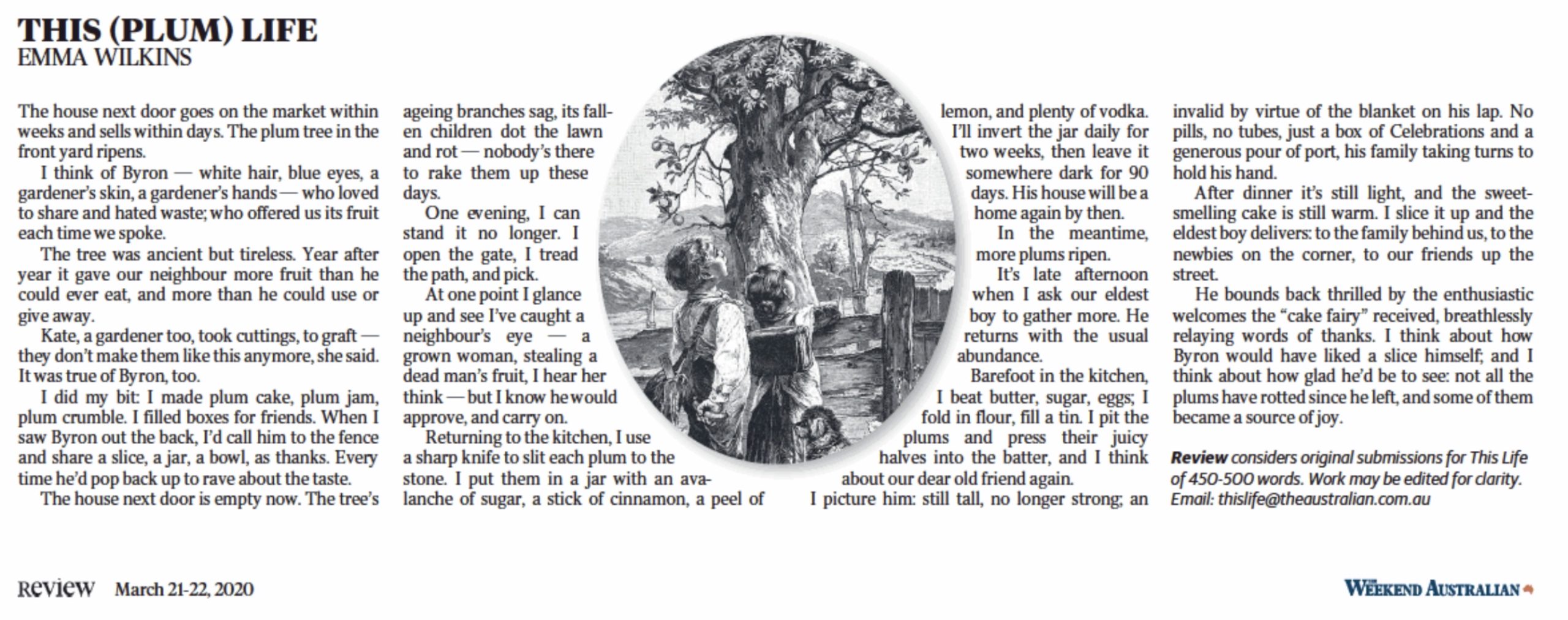The house next door goes on the market within weeks and sells within days. The plum tree in the front yard ripens.
I think of Byron—white hair, blue eyes, a gardener’s skin, a gardener’s hands—who loved to share and hated waste; who offered us its fruit day after day.
The tree was ancient but tireless. Year after year it gave our neighbour more fruit than he could ever eat, and more than he could use or give away. Kate, a gardener too, took cuttings, to graft—they don’t make them like this anymore, she said. It was true of Byron, too.
I did my bit: I made plum cake, plum jam, plum crumble. I filled boxes for friends. When I saw Byron out the back, I’d call him to the fence and share a slice, a jar, a bowl, as thanks. Every time he’d pop back up to rave about the taste.
The house next door is empty now. The tree’s ageing branches sag, its fallen children dot the lawn and rot—nobody’s there to rake them up these days.
One evening, I can stand it no longer. I open the gate, I tread the path, and pick.
At one point I glance up and see I’ve caught a neighbour’s eye—a grown woman, stealing a dead man’s fruit, I hear her think—but I know he would approve, and carry on.
Returning to the kitchen, I use a sharp knife to slit each plum to the stone. I put them in a jar with an avalanche of sugar, a stick of cinnamon, a peel of lemon, and plenty of vodka. I’ll invert the jar daily for two weeks, then leave it somewhere dark for ninety days. His house will be a home again by then.
In the meantime, more plums ripen. It’s late afternoon when I ask our eldest boy to gather more. He returns with the usual abundance.
Barefoot in the kitchen, I beat butter, sugar, eggs; I fold in flour, fill a tin. I pit the plums and press their juicy halves into the batter, and I think about our dear old friend again.
I picture him: still tall, no longer strong; an invalid by virtue of the blanket on his lap. No pills, no tubes, just a box of Celebrations and a generous pour of port, his family taking turns to hold his hand.
After dinner it’s still light, and the sweet-smelling cake is still warm. I slice it up and the eldest boy delivers: to the family behind us, to the newbies on the corner, to our friends up the street.
He bounds back thrilled by the enthusiastic welcomes the “cake fairy” received, breathlessly relaying words of thanks. I think about how Byron would have liked a slice himself; and I think about how glad he’d be to see: not all the plums have rotted since he left, and some of them became a source of joy.
Published in The Weekend Australian, March 2020
